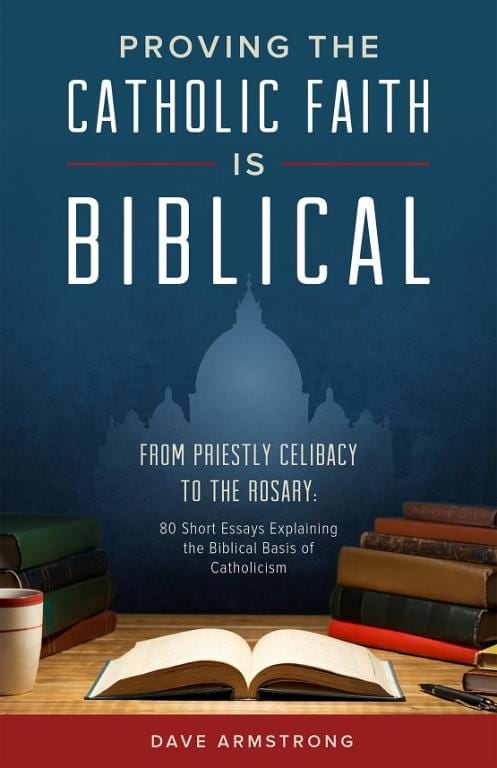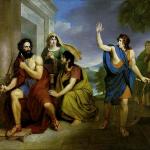
[see book and purchase information]
The Protestant (especially evangelicals and charismatics: and I am from both camps in my background) tends to look at Scripture and say, “what does this teach me?” As far as that goes, there is nothing wrong with it, except when all these individuals start looking at the same Scripture, that they all revere as the inspired, infallible Word of God, yet nevertheless disagree on the interpretation. Then we have a problem, because contradiction means someone is wrong, and wrong is a falsehood, and falsehood comes from the devil: the father of lies. Truth is not relative.
The Catholic Church (contrary to the false stereotype) accepts and encourages the individual to read his or her Bible, but goes much further and deeper than that. G. K. Chesterton said that tradition was the “democracy of the dead.” What he was getting at was the communal aspect of historic Christianity. The Catholic believes that the Church has learned a few things through the years, and that these can be passed on, so that we don’t have to reinvent the wheel in every generation.
The Catholic not only asks what God is communicating to him individually, but what He has taught all the millions of other Christians through history: holy people, saints, doctors, missionaries, priests, nuns, fervent laypeople. That’s the whole thing about the Church fathers. They were the “on-fire” Christians of the early centuries. What did they believe? What can we learn from them?
We choose the “democracy of the dead” rather than a head count of those of us who happen to be here today or some vote at a national convention or a poll in Christianity Today. We believe that if God can teach us things personally, He also teaches other folks, too, and has done so all along, so that we can learn from them. To a large extent, this is what tradition is. It’s really no more complicated than that.
Protestants have been accustomed for so long, to run down and disparage tradition, as “barnacles” on the ship, to be scraped off, or corruption, that they miss the simple, obvious beauty of the thing: the democracy of the dead: the community of the saints, gathered together not just geographically (like the Jerusalem Council of Acts 15) but over time as well, through history.
This is the cool thing about Catholicism. Whatever we can ponder in our heads, the Church has, inevitably, thought about for centuries, and has come to conclusions. Catholics trust these, as a function of trust in God, Who guides and protects His Church, as we believe. It doesn’t mean that the Church has always been perfect in every way, about everything, but when something has been “officially” declared by pope, council or official catechism, we can accept it as trustworthy.
The individual doesn’t have to figure everything out. That’s impractical and, I contend, impossible, anyway. Who of us is the font of all wisdom? How silly is that notion?! Who even wants to have that burden and responsibility? God never meant His Church or the individual Christian to function that way. There is something far greater than merely our own private judgment and discernment.
That is Catholicism. What has been believed in the past and passed down is extremely important. The Church eventually develops these thoughts and proclaims dogmas, after (usually) many centuries of reflection.
***
Related Reading
“Tradition” Isn’t a Dirty Word [late 90s; rev. 8-16-16]
Binding, Authoritative Tradition According to St. Paul [2004]
Martin Luther’s Remarkably “Pro-Tradition” Strain of Thought [1-18-08]
Biblical Evidence for Apostolic Oral Tradition [2-20-09]
25 Brief Arguments for Binding Catholic Tradition [2009]
Tradition, Succession, Apostolic Deposit (vs. Calvin #25) [7-1-09]
Tradition, Church, & the Rule of Faith (vs. Calvin #27) [7-6-09]
Biblical Evidence for True Apostolic Tradition (vs. “Traditions of Men”) [6-23-11]
Biblical Evidence for the Oral Torah [10-18-11]
Tradition is Not a Dirty Word — It’s a Great Gift [National Catholic Register, 4-24-17]
Did Jesus Commission the New Testament (or the Disciples?) [5-31-18]
2 Thessalonians 2:15, Sacred Tradition, & Sola Scriptura [8-28-18]
Why Conform to Orthodoxy and Sacred Tradition? [3-20-19]
Anglican Newman on Oral & Written Apostolic Tradition [10-12-19]
In the Bible, “Word of God” Usually Means Oral Proclamation [National Catholic Register, 12-17-19]
***
(originally from 2015)
***













